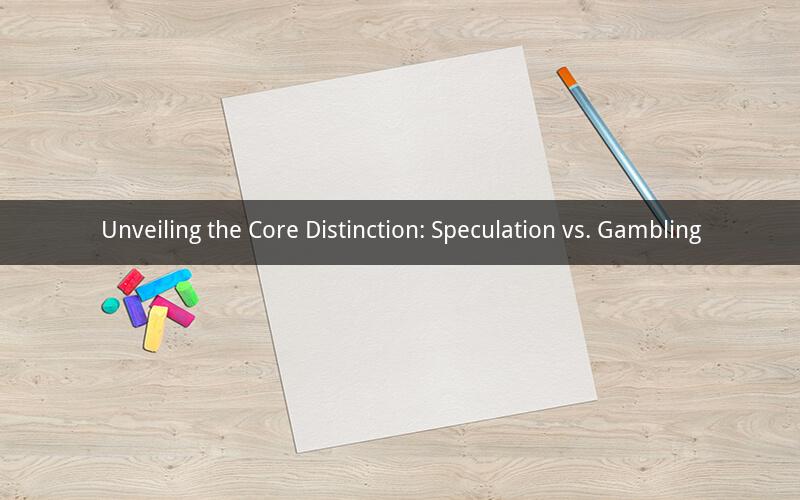
In the realm of financial markets and investment strategies, the terms "speculation" and "gambling" are often used interchangeably. However, there lies a significant difference between the two that can impact an individual's approach to investment and the potential outcomes. This article delves into the key distinctions between speculation and gambling, exploring their definitions, motivations, and the risks involved.
Understanding Speculation
Speculation is a calculated and informed decision-making process aimed at profiting from the fluctuation of asset prices. It involves thorough research, analysis, and an understanding of market dynamics. Speculators are typically individuals or entities that engage in buying or selling assets with the anticipation of making a profit in the short or long term.
Motivations for Speculation
The primary motivation behind speculation is the pursuit of profit. Speculators analyze various factors, such as market trends, economic indicators, and technical analysis, to make informed decisions. They may also consider the fundamental aspects of an asset, such as its supply and demand, to predict its future price movements.
Key Characteristics of Speculation
1. Informed Decision-Making: Speculators rely on research and analysis to make informed decisions. They gather data, study market trends, and evaluate the potential risks and rewards associated with their investments.
2. Risk Management: Speculators are aware of the risks involved in their investments and take measures to mitigate them. They may use stop-loss orders, diversify their portfolios, or adjust their positions based on market conditions.
3. Long-Term Perspective: While speculators may aim for short-term profits, they often have a long-term perspective. They may hold onto their investments for an extended period, allowing the market to work in their favor.
Understanding Gambling
Gambling, on the other hand, is an activity that involves betting on an uncertain outcome with the hope of winning money. It is typically characterized by luck, chance, and a lack of knowledge about the underlying factors that influence the outcome.
Motivations for Gambling
Gamblers are driven by the desire to win money and the thrill of taking risks. They may engage in gambling activities such as betting on sports, playing casino games, or participating in lotteries.
Key Characteristics of Gambling
1. Lack of Informed Decision-Making: Gamblers often rely on luck and chance rather than research and analysis. They may not have a clear understanding of the factors that influence the outcome of their bets.
2. No Risk Management: Gamblers typically do not engage in risk management strategies. They may continue to bet despite losing money, leading to potential financial ruin.
3. Short-Term Perspective: Gamblers often have a short-term perspective, focusing on immediate gains rather than long-term investments.
The Core Difference: Informed Decision-Making
The key difference between speculation and gambling lies in the element of informed decision-making. Speculators rely on research, analysis, and an understanding of market dynamics, while gamblers rely on luck and chance.
5 Questions and Answers
1. Question: How does speculation differ from gambling in terms of risk management?
Answer: Speculators engage in risk management strategies, such as setting stop-loss orders and diversifying their portfolios, to mitigate potential losses. Gamblers, on the other hand, typically do not employ risk management strategies, leading to higher potential for financial ruin.
2. Question: Can a speculator be a gambler, and vice versa?
Answer: Yes, a speculator can be a gambler if they rely on luck and chance rather than informed decision-making. Similarly, a gambler can become a speculator if they start to research and analyze market factors before making investment decisions.
3. Question: What are some common assets speculators and gamblers invest in?
Answer: Speculators and gamblers may invest in various assets, including stocks, bonds, commodities, cryptocurrencies, and sports events. However, speculators tend to focus on assets with higher liquidity and lower risk, while gamblers may opt for assets with higher risk and lower liquidity.
4. Question: Can speculation be considered a form of gambling?
Answer: While speculation shares some similarities with gambling, such as the pursuit of profit and the element of risk, it is not considered a form of gambling. Speculation requires informed decision-making and an understanding of market dynamics, which gambling lacks.
5. Question: How can one differentiate between speculation and gambling in their investment strategy?
Answer: To differentiate between speculation and gambling, one should focus on the level of research, analysis, and risk management involved in their investment decisions. Speculation requires a well-informed approach, while gambling relies on luck and chance.
In conclusion, the key difference between speculation and gambling lies in the element of informed decision-making. Speculators rely on research, analysis, and risk management to make informed decisions, while gamblers rely on luck and chance. Understanding this distinction can help individuals approach investment with a more informed perspective and potentially improve their chances of success in the financial markets.